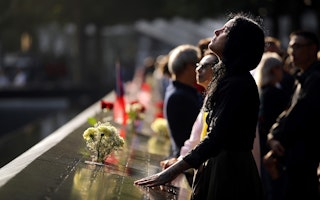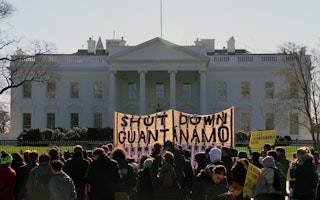Accountability on Drones Continues to Fall Short
By Richard Weir
Earlier this year, President Obama told the world that a U.S. drone strike accidentally killed an American and Italian, both al-Qaeda-held hostages, in Pakistan. After acknowledging the killings, the White House apologized and promised to compensate both families for their losses—an unprecedented and welcome change in the administration’s posture towards the secret lethal drone program.
In a letter to the president [PDF], the Open Society Foundations, along with nine civil society and human rights groups, urged the Obama administration to apply this same policy to all civilians who are killed or injured in a U.S. drone strike, not just U.S. citizens or other Westerners. Each strike should be subject to a thorough and independent investigation, and the U.S. government should publicly acknowledge the harm to civilians, apologize, and offer compensation to families of the victims.
The Open Society Foundations and its grantees and partners have previously documented U.S. drone strikes in Yemen and Pakistan and pressed the Obama administration to disclose information regarding the legal and policy justifications for the drone program. This letter is part of our ongoing efforts to bring greater transparency and meaningful accountability for all civilian victims.
The Obama administration has vowed on several occasions since 2013 to improve transparency and oversight, but it has made little progress to date. In certain places where the United States has relied on armed drones, like in Somalia, the military has recently begun to acknowledge strikes. In other areas, especially in Pakistan and Yemen, the killings continue under a shroud of secrecy and bureaucratic opacity.
The program cannot be properly evaluated and publicly debated when the full legal basis under which it is conducted and civilian casualty data are withheld from the public. To effectuate the president’s avowed goal of ensuring that targeting operations are “more transparent to the American people and the world,” the legal opinions and Presidential Policy Guidance that undergird the program should immediately be made public.
Currently, congressional committees tasked with oversight of the program do not even have access to all of the administration’s interpretations of relevant law. Since 2010, members of the Senate intelligence committee have requested the release of all of the Office of Legal Counsel’s opinions related to targeted killing operations. Only four—of what is believed to be at least nine opinions— have been shared. Proper oversight cannot reasonably be conducted by the committees without these opinions.
Post-strike investigations also need to be formalized and, to the maximum extent possible, disclosed to the public. Fortunately, the U.S. government has recently demonstrated that it can complete an investigation of a strike when it has no investigators on the ground—and that it can be made public.
The recently declassified report [PDF] of a U.S. airstrike in Syria in 2014 concluded that the U.S. military more than likely killed two children. This report proves that the U.S. government has the capability and creativity to conduct investigations in hostile environments and make them available to the public.
Moreover, formalizing a post-strike investigation process that can later be evaluated by the public will facilitate the achievement of two other important goals—accountability and redress. It would require the responsible agency to do its utmost to identify whether it adhered to standards used for targeting and aid in the identification of civilian victims, if any.
When the United States kills or injures civilians, it should take responsibility for its actions and offer redress to civilian victims. Again, the president and the U.S. government need not look much further than their own actions as an example for the way forward. When the president acknowledged that the two hostages held in Pakistan were killed, he apologized, and the White House said the families would be compensated for their loss.
The U.S. military has taken steps to compensate civilians harmed by combat operations in Iraq and Afghanistan. The program of ex gratia payments—payments made without legal obligation—is now codified in U.S. law and part of U.S. military’s in-theater doctrine. At the very least, a similar program should be established for the victims’ families of U.S. drone strikes.
Indeed, Lisa Monaco, deputy national security advisor, said recently that it is not U.S. policy to compensate only Westerners and Americans who are killed by U.S. drone strikes. She also said that the U.S. government is working hard to develop a compensation framework that can be applied consistently. The administration’s commitment is laudable, but not yet tangible.
The lack of a clear policy today makes the future more dangerous: It means that other countries could claim a measure of justification for reckless targeted killings if and when they acquire similar technology. It means the public is kept in the dark about the legality of the program. It means that families of the victims don’t get justice. Finally, it means that Americans are left to wonder who their government is killing and why.
Until August 2015, Richard Weir was a law clerk for the Open Society Foundations in Washington, D.C.


